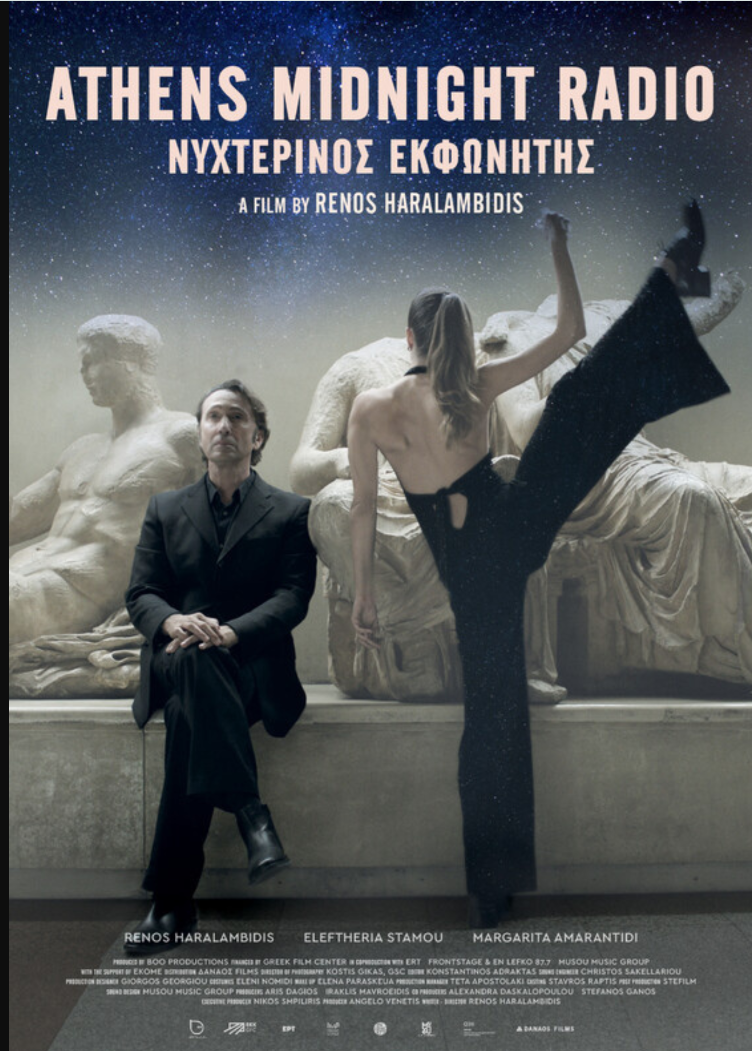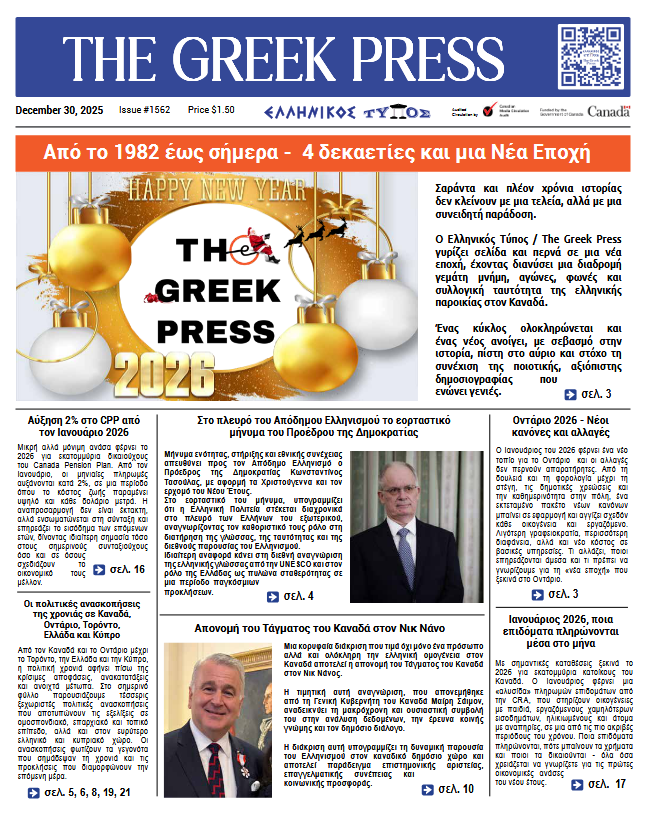 CLICK TO VIEW THE WHOLE PUBLICATION ONLINE
CLICK TO VIEW THE WHOLE PUBLICATION ONLINEBy Emorphia Margaritis
Actor, writer, director, and radio host Renos Haralambidis has been a defining presence in Greek television and cinema for over three decades. A pioneer of digital filmmaking in Greece, he helped usher in a new era of independent storytelling with his directorial debut No Budget Story (1997). He followed it with the now-cult classic Cheap Smokes (2000), a staple of Greek cinema currently experiencing a cultural resurgence in Athens. Known for his youthful, modern style, Haralambidis creates films that blur the lines between reality and fiction. Now, with his fifth feature film, The Night Announcer (2024)—which he wrote, directed, and starred in—he once again delivers a visually striking and deeply symbolic story that captures the soul of Athens.
In the film, our main character Eusonas—a veteran late-night radio host—sets out on his fiftieth birthday in search of a long-lost love from his youth: a ballerina who marked a turning point in his life, one he is only now ready to revisit. As he reopens the chapter of their past, his journey of self-realization and rediscovery unfolds against the poetic and visually evocative backdrop of nighttime Athens.
Reflecting on his personal identity crisis at fifty, Haralambidis explains, “It was also the internal voice of ancient Athens that called me to create this film.” This profound connection guides the story of The Night Announcer, which, beyond its rich subtext and poetic visuals, stands out for its powerful use of Parthenon imagery—a rarity in film history. Haralambidis transforms the Acropolis metro station, where the replica of the East Pediment becomes both a storytelling device and a wellspring of emotional resonance for the main character. Driven by a desire to echo the city’s visual landscape, he expressed his deep affection for “a part of Athens that never had a debut”—and with this film, he gives it one on the big screen, sharing it intimately with his audiences.
When asked to elaborate on the inspiration and motivation behind the film, Renos responded:
“In my 50s I had to have a deep internal dialogue with myself about who I wanna be from now on… I believe that people rewrite the script of their lives in their 50s. A lot of times they re-discover a new version of themselves.”
Drawing from his personal journey, which added depth to the film, he further elaborated on the philosophical meanings underlying the story. He emphasized the importance of revisiting past relationships in order to better understand oneself. In the film, the main character returns to a pivotal period in his life—a time when he was younger, stronger, but also arrogant. Renos adds: “In order to understand who he was and specifically who he was in relation to other people… he goes back to that time in his life so he can understand the core of his existence. Otherwise, he wouldn't be able to grow wiser, mature, and therefore have the possibility to live a better life if he doesn't analyze his past experiences.” Renos also highlighted the key role the ballerina plays in the story: “He was fortunate to have met this wise and artistic ballerina, who left him with beautiful messages—like clues creating a roadmap back to himself.”
The two leading characters are richly developed—fleshed out with honesty and rawness. The ballerina, in particular, embodies 21st-century feminism through both her behavior and presence. She may be flawed, but she is wise, passionate, and true to herself—a quality symbolized by Renos’s directorial choice to have her dance in her everyday clothes rather than a costume, in contrast to how Eusonas presents in his youth, hiding behind a uniform. Within the story, she challenges the male protagonist to reflect and grow. It is through her artistic voice that his narrative takes shape. She becomes a kind of teacher—one who understands that her lessons may only be fully recognized when he is ready to receive them. Renos offers deeper insight: “Sometimes we don't interpret certain connections we make in our lives the right way—we undermine them, especially when we're young… for a person to understand and gain perspective, they need time.”
An often overlooked facet of Renos is his musical talent and deep love for music, which plays a significant role in the film. The soundtrack functions almost as a character itself. Renos explains, “Music is part of my storytelling… The soundtrack tells the hidden story of the film.” Throughout the film, music serves as a subtle voiceover, guiding the audience deeper into the protagonist’s journey and enriching the layered subtext of the film.
Sometimes life imitates art. Off screen, the parallels continue: in a beautiful synchronicity of timing, Renos Haralambidis hosts a morning radio show on EN LEFKO 87.7, where he champions Greek and world cinema to a younger audience, urging them to experience films in theaters. “The radio show offers me the joy of connecting with my audience,” he shares, “and for them, it brings a good morning company that offers wise optimism.”
That same desire for human connection extends to the way Renos thinks about cinema. “For cinemas to work, there needs to be a togetherness,” because it is only then that the magic of the big screen comes alive—“where strangers share a collective space and are united through that shared experience.”
Carrying that same spirit—paired with the film’s memorable soundtrack and striking imagery—Renos Haralambidis’s The Night Announcer becomes a truly ideal cinematic experience. Don’t miss the opportunity to see it at the Greek International Film Festival this October.


.png)




























